Meet the Partner
Every week in this section, we will present our CHANGER partners and their distinct role and work within the project.
The National Center for Scientific Research Demokritos – NCSRD
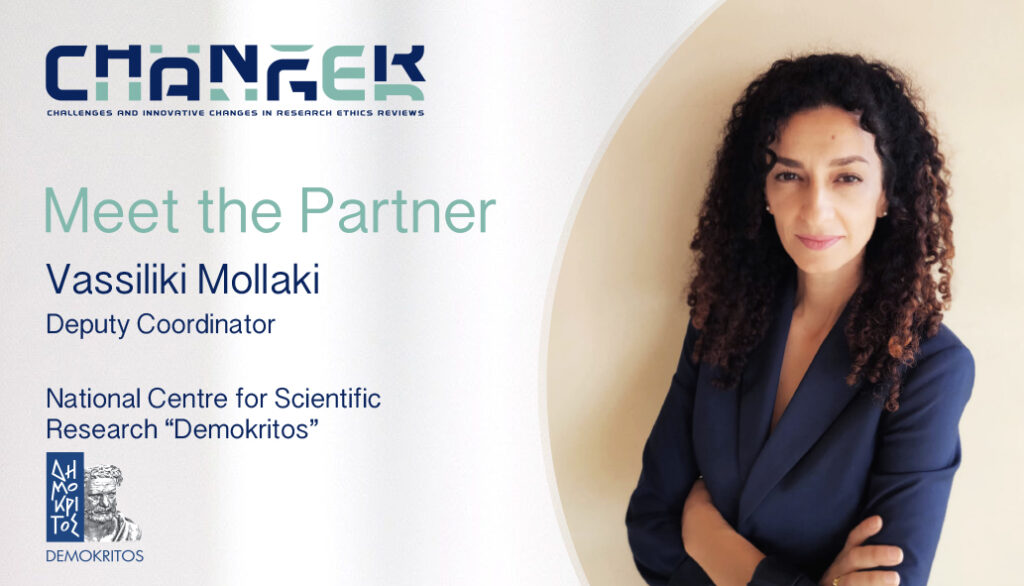
The National Centre for Scientific Research Demokritos (NCSR Demokritos) is the largest Greek self-governing research organisation under the supervision of the General Secretariat for Research and Technology (GSRT) of the Greek Government. NCSR Demokritos participates with the AI Politeia Lab of its Institute of Informatics and Telecommunications.
The AI Politeia Lab is an interdisciplinary lab exploring how we can ensure a responsible and sustainable technology-enabled future; that is trustworthy, ethical and democratised for all and for the good. Adopting a collaborative, multi-stakeholder approach and “out of the box”, anticipatory thinking, this laboratory involves researchers from various disciplines and provides a virtual “AI Politeia” environment for innovative academic and industrial research and applications across domains. AI Politeia connects AI and technological innovation with social sciences and policy aiming to explore the opportunities, risks posed by technological innovation, and strike a balance between innovation, ethics, human rights, values, law and policy.
Role in the Project: Dr. Vasiliki Mollaki is the Deputy Project Coordinator leading WP1 Project management, coordination and dissemination, with the responsibility of successfully managing the project and disseminating its results. NCSR Demokritos also contributes to all other work packages, namely WP2 Evaluation of current ethics reviews in a changing research environment, WP3 Novel approaches and tools to support the ethics reviews, WP4 Innovative training material to address new challenges in ethics reviews and training and, WP5 Generation of impact and transferability of new models, operational tools, and approaches for RECs.
Partner Website: https://www.iit.demokritos.gr/
University of West Attica – UNIWA
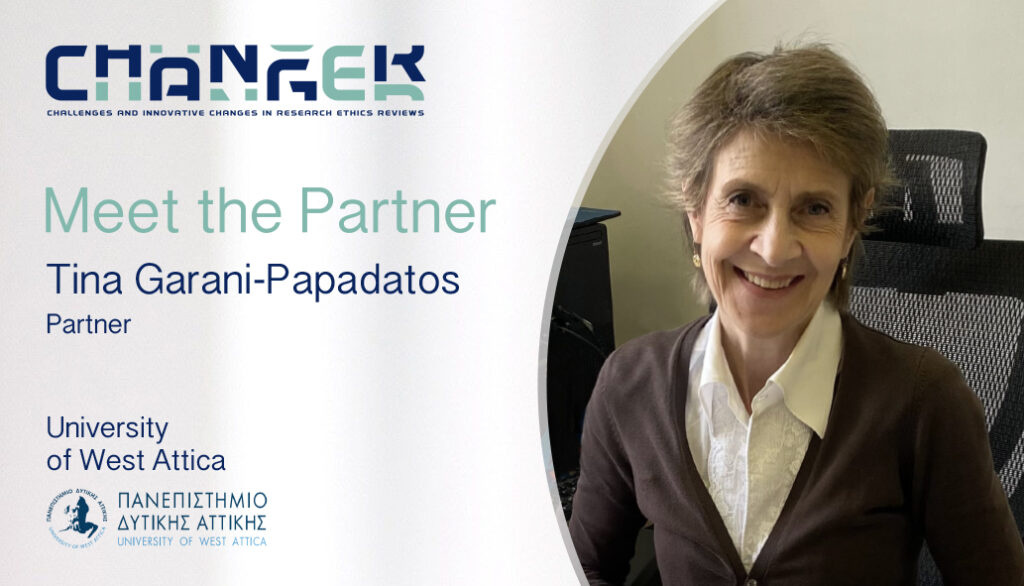
UNIWA was founded in March 2018. The foundation of the newly established University came from the merging process of the former Technological Educational Institute of Athens and Piraeus University of Applied Sciences. Today, UNIWA includes twenty-seven departments, organised into six Schools, covering a wide range of disciplines such as modern science, including social, administrative and economic sciences, engineering sciences, health and welfare sciences, food sciences and art studies. In 2019, the National School of Public Health, originally established in 1929, joined the newly established university and was renamed to Dept. of Public Health Policy which is recognized as the continuation of the NSPH. UNIWA participates in this project with the Laboratory for Health Technology Assessment – LabHTA, Dept of Public Health policy. Given the long history of the Dept, the LabHTA is not only highly specialised in education and research in all multidisciplinary areas of public health and health care policy but also has a long-time involvement and experience in bioethics and health law.
Role in the project: In the frame of the project, UNIWA with Professor Tina Garani-Papadatos is participating in WP1 Project Management, Coordination and Dissemination, in WP2 “Evaluation of current ethics reviews in a changing research environment”, particularly in Task 2.3 concerning Stakeholder consultations and T 2.4 concerning cross- disciplinary case study of ethics review experts. UNIWA has a more active role in WP3 “Novel approaches and tools to support the ethics reviews” and WP5 “Generation of impact and transferability of new models, operational tools, and approaches for RECs”.
Partner website: https://php.uniwa.gr
Medical Faculty Split – MEFST
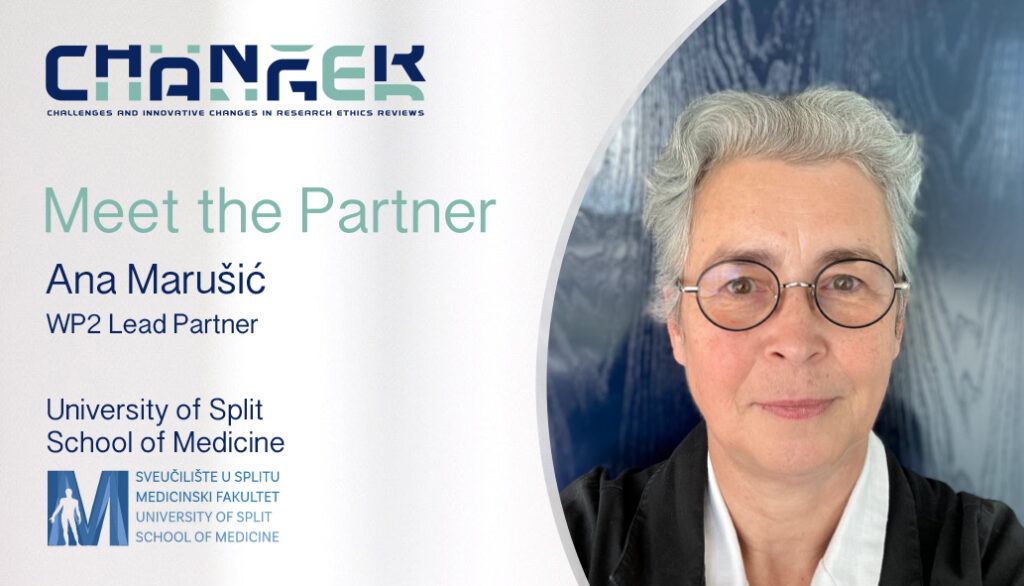
The University of Split School of Medicine (MEFST) is an independent faculty established in 1997 as one of the components of the University of Split. It is situated on the Southern coast of the Split peninsula overlooking the Adriatic Sea and the islands of Brač, Šolta and Hvar. MEFST has four teaching programs: Medicine, Dental Medicine, Pharmacy and Medical Studies in English. The Postgraduate School includes research and specialist postgraduate studies and it is also open to international students.
The Center for Evidence-Based Medicine is an integral part of the School. It was founded in 2018 with the idea of being a place of scientific excellence, continuous education and popularisation of evidence-based medicine. The Center closely collaborates with the Science Department of the University Hospital of Split and the Research Office of the University of Split School of Medicine. The activities of the Center aim to improve the School’s and the University Hospital’s scientific production and healthcare quality. Research topics include clinical epidemiology and evidence-based medicine, research ethics and integrity, open science and research reproducibility.
Role in the Project: As the lead partner in Work package WP2 – Evaluation of current ethics reviews in a changing research environment, MEFST will be organising the assessment of current tools and practices, and will be heavily involved in the development of new approaches and the production of training material for those.
Partner website: https://mefst.unist.hr/en
University of Groningen – RUG
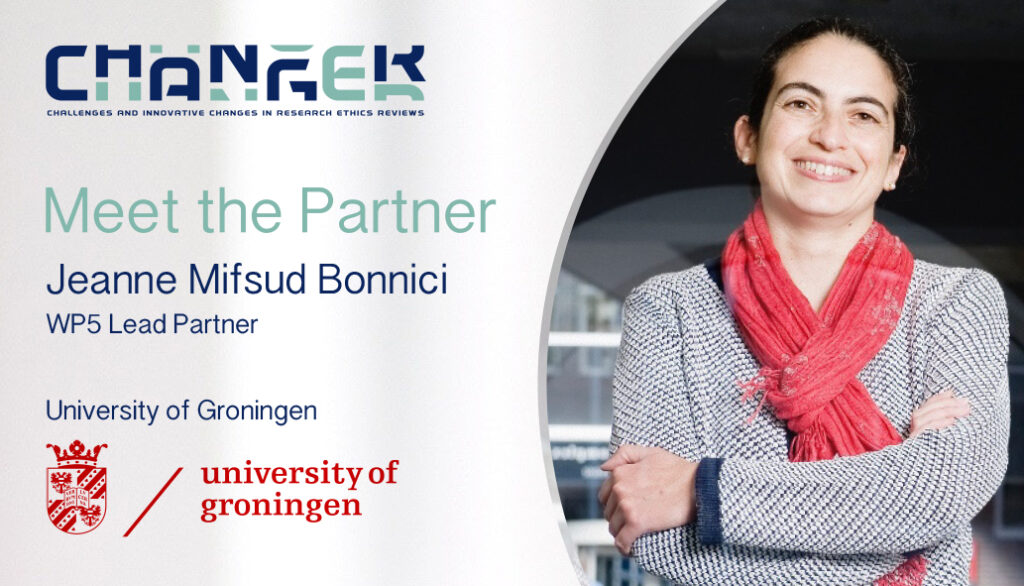
RUG is one of the largest faculties in the Netherlands and has a strong research tradition in a number of fields including European law, information technology law, constitutional law, international law, public law, civil law and a variety of interdisciplinary fields. STeP, the ‘Security, Technology and e-Privacy Research Group’, is an interdisciplinary team of researchers organised within the Department of Transboundary Legal Studies. The team covers many areas of information policy and technology law including privacy, data protection, security science, cybercrime, self-regulation, ethics, and health informatics.
Role in the project: In the frame of CHANGER, STeP’s members, Professor Mifsud Bonnici and Dr. Markellou lead the WP5 ‘Generation of impact and transferability of new models, operational tools, and approaches for RECs’ the objectives of which are, among others, to promote policy choices supporting the uptake and dissemination of novel ethics review approaches in the ERA at different levels (European, national, research organisations).
Partner’s website: https://www.rug.nl
TU WIEN
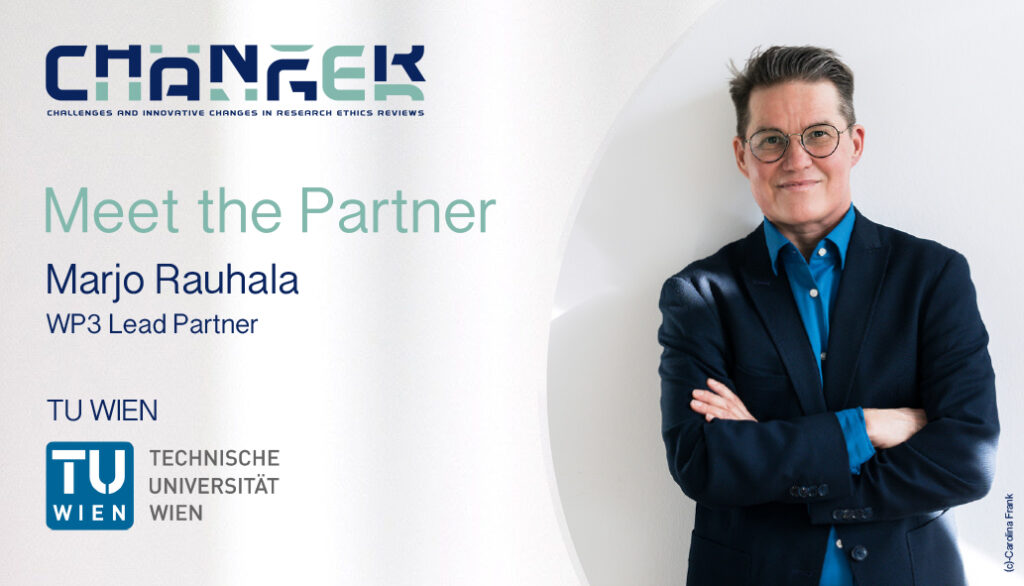
TU Wien is Austria’s largest research and educational institution in the field of technology and natural sciences. More than 4,000 scientists are researching “technology for people” in five main research areas at eight faculties. Located directly in the Vice Rectorate for Research, Innovation and International Affairs, the Service Unit of Responsible Research Practices hosts the Research Ethics Committee of TU Wien.
Role in the project: Marjo Rauhala is the head of the Service Unit of Responsible Research Practices with tasks including supporting members of the TU research community in identifying and addressing ethical dimensions in their research and setting up research ethics structures for the university. Drawing on a theoretical background in philosophical, biomedical and research ethics and hands-on engineering ethics from collaboration in TU Wien research teams, Marjo has a great interest in taking research ethics review beyond ticking boxes. In CHANGER, Marjo co-leads WP3 and is involved in all work packages.
Jonas Pfister works in the Service Unit of Responsible Research Practices and is involved in all work packages of CHANGER.
Partner’s website: https://www.tuwien.at/en
Norwegian Institute for Sustainability Research – NORSUS
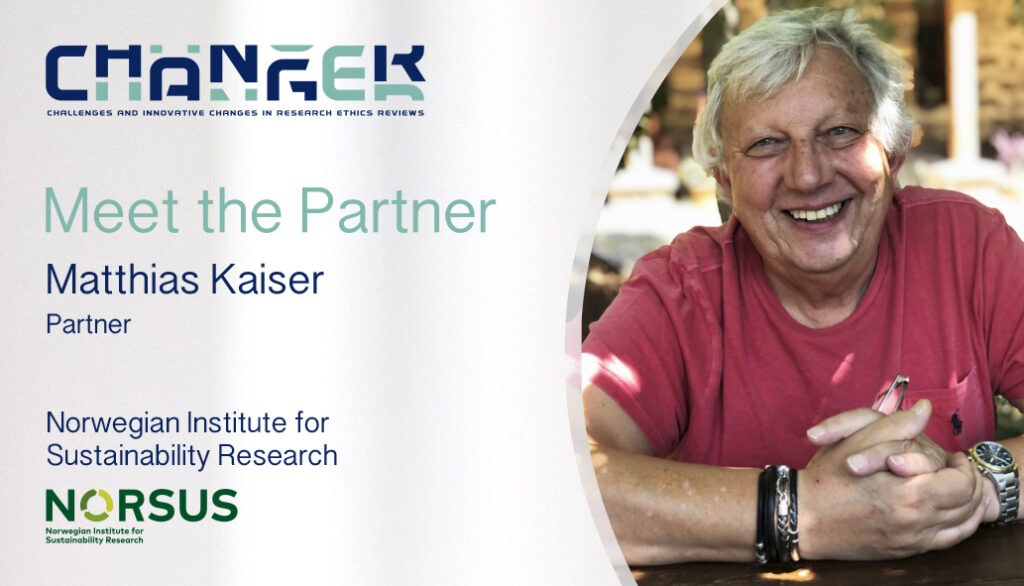
NORSUS Norwegian Institute for Sustainability Research is a private not-for-profit research institute, receiving basic funding from the Research Council of Norway. The mission of NORSUS is to provide knowledge for sustainable societal development. The institute applies and develops knowledge and methods to understand and implement sustainable solutions in society. Together with a wide range of public and private clients, NORSUS undertakes projects locally, nationally and internationally to enhance environmental performance. Alongside the main focus on industrial environmental research, the projects increasingly also address the social and economic pillars of sustainability. The sustainability of AI solutions is a research topic at the institute.
The NORSUS Principal Investigator in CHANGER is Matthias Kaiser, who is a senior researcher at NORSUS, Professor Emeritus at the Center for the Study of the Sciences and Humanities (SVT) at the University of Bergen, and Prof. II (10%) at the NTNU in Trondheim. Matthias has studied mathematics and philosophy (of science) at the universities of Munich, Oslo, Stanford and Frankfurt. Ellen-Marie Forsberg, Managing Director of NORSUS, has a minor research component in the project. Ellen-Marie has a doctorate in applied ethics from the University of Oslo in 2007 and has extensive research and practical experience with research ethics.
Role in the project: In CHANGER project, NORSUS co-leads WP3 and participates in several other WPs. WP3 will result in innovative tools for ethical reviews and assessments in research projects.
Partner’s website: www.norsus.no/en
University of Bucharest – UB
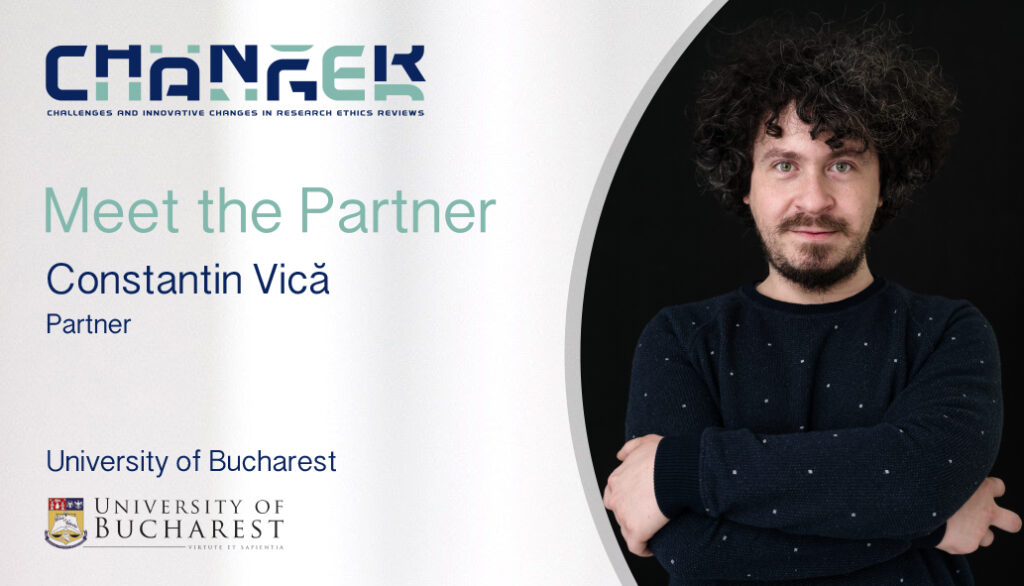
University of Bucharest (UB) is expert in academic ethics and integrity, and the convergence between research integrity and academic integrity, in building ethical infrastructure for research (from codes to self-training tools), and has a strong research activity in digital and data ethics, artificial intelligence ethics and virtual reality ethics.
Role in the project: Associate Professor Constantin Vică leads the UB team which contributes to WP2, WP3 and WP4. Due to the experience UB has in teaching academic and research ethics (BA, MA and doctoral levels), in writing handbooks, and in public engagement in debates on research ethics topics, the team will contribute to the analysis, development and training work packages.
Partner’s website: https://unibuc.ro/?lang=en
Ss. Cyril and Methodius University in Skopje – UKIM
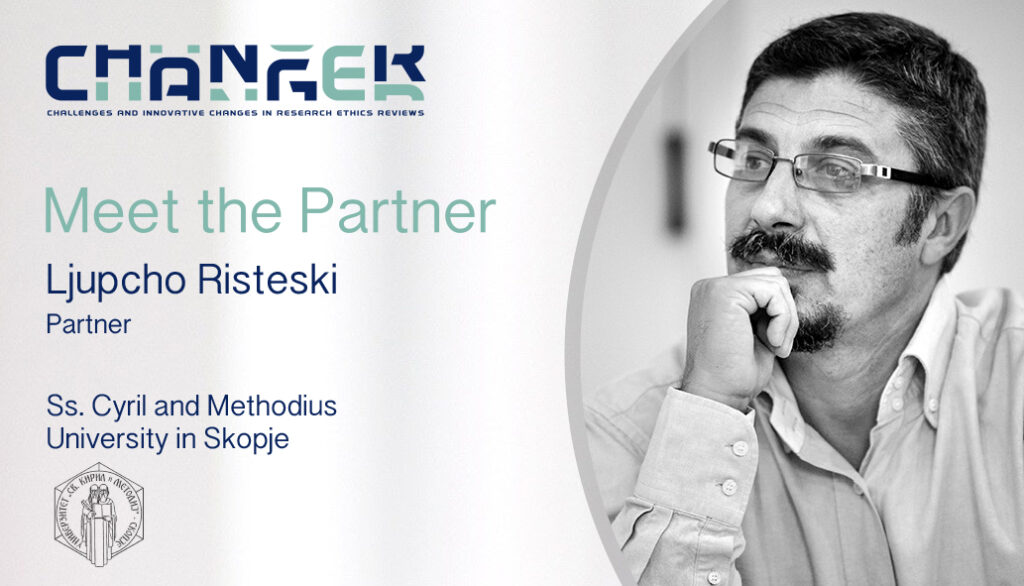
“Sts. Cyril and Methodius” University is an autonomous, higher educational institution that provides teaching, scholarship and applied activities in technical, natural sciences and mathematics, bio-technical, artistic, medical, and social sciences. The Institute of Ethnology is a department at the Faculty of Natural Sciences and Mathematics at the university. The disciplines of ethnology and anthropology have seen a development in the status of research stakeholders over the years, and today the establishment of a partner relationship between all stakeholders in research is a priority through which one can achieve respect for the rights of those involved, their integrity, protection of their personal and collective rights of anonymity, privacy and mutual trust. Ethical bodies in anthropology act as advisory bodies, partners, and educational bodies that affect improvement in the quality of research and the well-being of all stakeholders.
Role in the project: Dr. Ljupcho Risteski, professor at the Institute of Ethnology and Anthropology, Faculty of Natural Sciences and Mathematics, and doctoral candidate Eda Starova Tahir are involved in WP1, WP2, and WP3: Evaluation of current ethics reviews in a changing research environment.
Partner’s website: www.ukim.edu.mk/en_index.php
University of Bonn – UBO
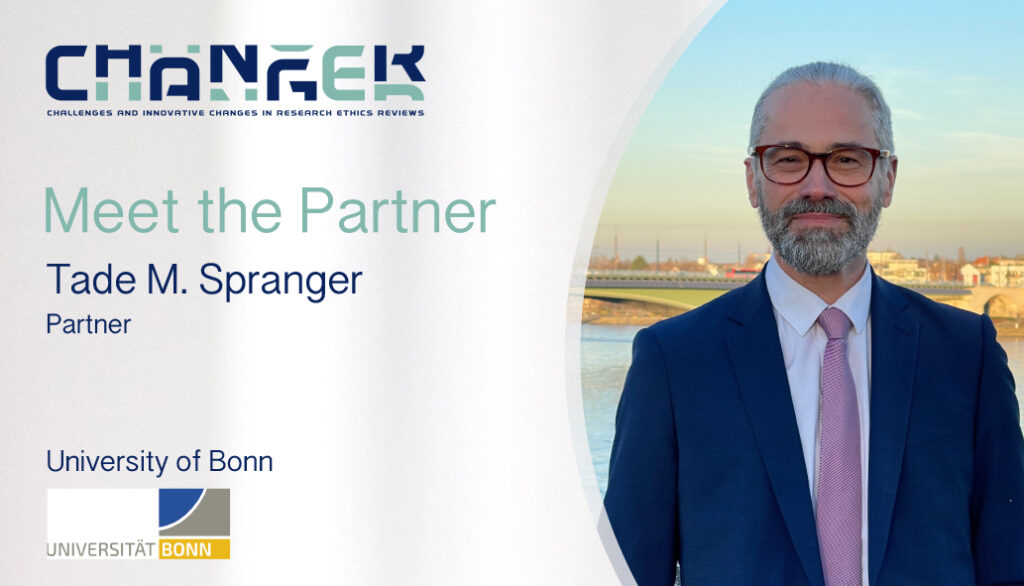
The Centre for the Law of Life Sciences is an interdisciplinary research unit of the Rheinische Friedrich-Wilhelms Universität Bonn. The Centre is dedicated to address legal questions raised by the rapid and steady progress in the areas of modern life sciences and substantiate the overall social discourse by a jurisprudential and regulation-oriented view. The Center conducts science-based studies, as well as practical policy advisory activities.
Role in the project: Since 2009 Dr. Tade Matthias Spranger is Extraordinary Professor at the Faculty of Law of the University of Bonn where he teaches in the fields of state and administrative law, European law as well as German and international law of biotechnology with a focus on Life Science Regulation. Since 2003 he has also been a member of the Ethics Committee of the School of Medicine of the University of Bonn, in addition to serving on other ethics committees. Beyond that he was head of the BMBF Research Group “Norm-Setting in the Modern Life Sciences” from 2006 to 2015. From 2010 to 2017 he was a Member of the DFG Permanent Senate Commission on Genetic Research and a Member of the Ethics Advisory Board of the Human Brain Project from 2014-2020. Tade Spranger has more than 500 publications on German Administrative and Constitutional Law, International Biomedical and Biotechnology Law, Intellectual Property Law. He has extensive legal expertise in the areas of genome editing, health data protection, Neurotechnology and artificial intelligence and therefore offers the project comprehensive legal support. As part of the project Tade Spranger is focussing on the legal challenges, i.e. the regulatory framework for new and challenging technologies and how to deal with them, in order to clarify existing and emerging legal issues in this regard.
Partner’s website: https://www.jura.uni-bonn.de/en/centre-for-the-law-of-life-sciences/
Knowledge and Innovation – K&I srls
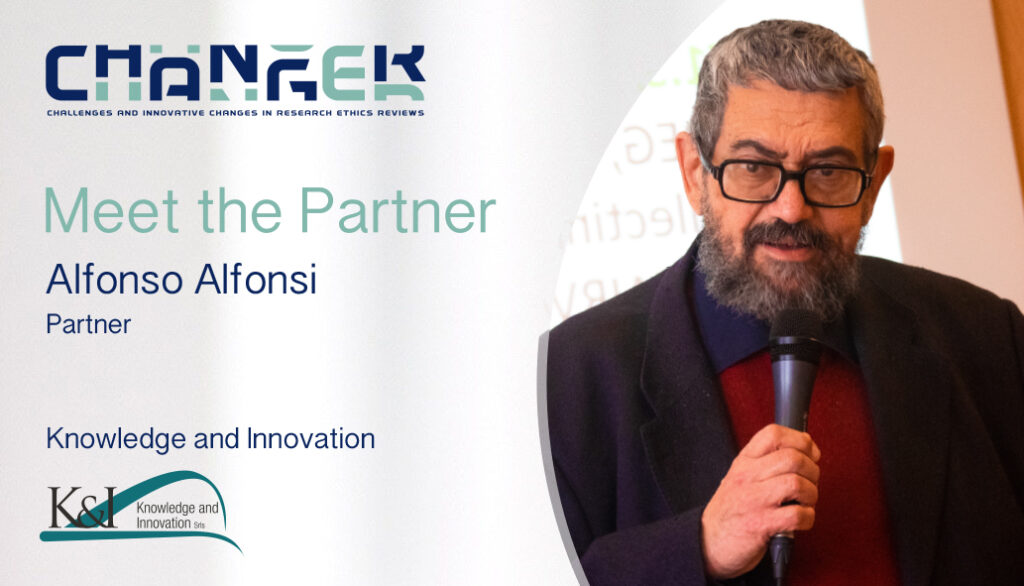
Knowledge & Innovation (K&I) is an independent social research institute whose mission is to promote, plan and carry out applied research projects in various areas related to the processes of change affecting contemporary societies. K&I is currently involved in several research projects on the relationship between science and society on topics such as gender in science, ethics and integrity of research, socio-technical development, responsible research and innovation, public engagement, citizen science, migration, environmental sustainability and energy.
Role in the project: K&I is responsible for organising the dialogue events (WP5) involving experts and researchers to understand how to promote the adoption of the new methodological approaches to research ethics oversight developed by CHANGER and how to develop policy and legal frameworks for the protection of new and emerging human rights. K&I is also involved in various activities in WP2, WP3 and WP4. The K&I team consists of Alfonso Alfonsi, Luciano d’Andrea and Maresa Berliri.
Partner’s website: https://www.knowledge-innovation.org/
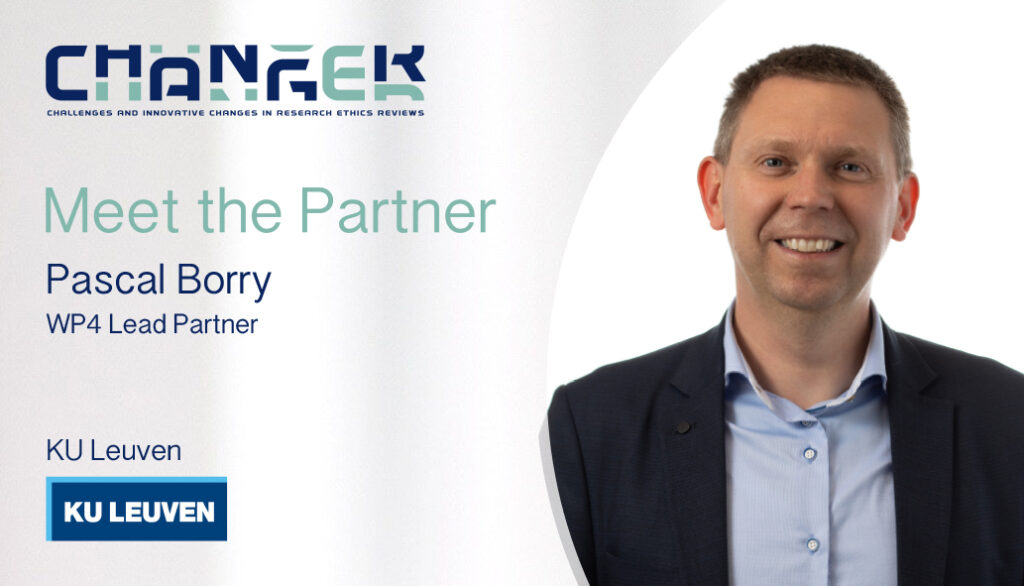
KU Leuven
KU Leuven is a research-intensive, internationally oriented university that carries out both fundamental and applied research. It is strongly inter- and multidisciplinary in focus and strives for international excellence. The Centre for Biomedical Ethics and Law at KU Leuven is a well established and renowned interdisciplinary research centre in Europe that counts more than 30 staff members and that coordinates a Master of Bioethics.
Role in the project: Professor Pascal Borry is the lead partner of WP4: Guidelines and Training on new challenges in research. This includes the development of guidance documents for professionals involved in research ethics reviews, the development of novel, digital training material, focused on specific new technologies and to provide training to stakeholders involved in the ethics review process of funders (EC).
Partner’s website: www.kuleuven.be; www.cbmer.be
Ludwig Maximilians University of Munich – LMU MUENCHEN
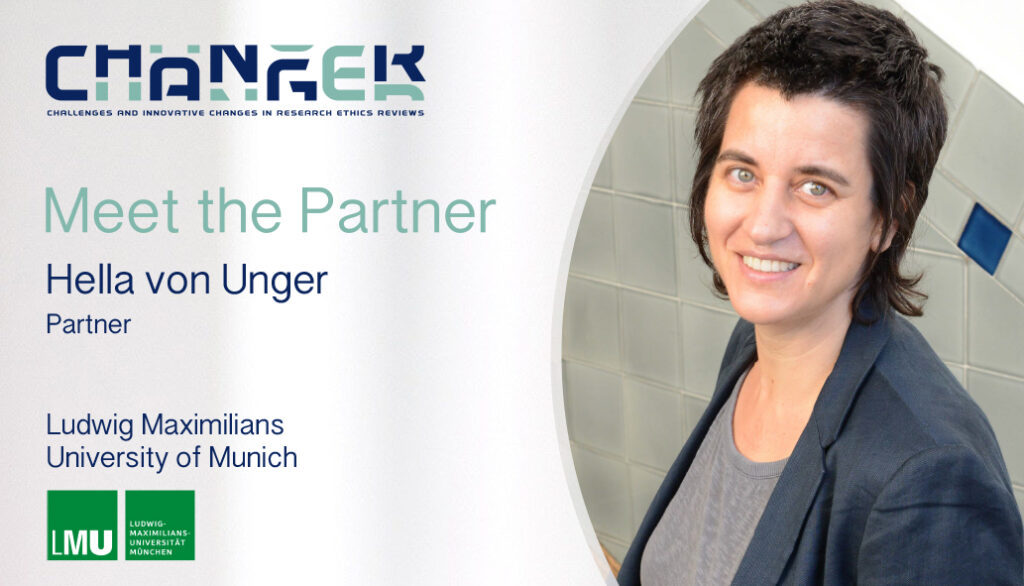
LMU Munich is a public research university located in the heart of Munich, Germany. LMU is one of the most prestigious and traditional universities in Europe. Since its foundation in 1472, it has been committed to the highest international standards of excellence in research and teaching. It combines outstanding research with a challenging range of courses. The Department of Sociology is one of the most renowned teaching institutions in the field in Germany. The diversity of the seven teaching and research units allows for a comprehensive and highly differentiated education and research in sociology. Within the Department of Sociology, the unit of Qualitative Social Research (Prof. Dr. Hella von Unger) specializes in qualitative methodologies, including participatory research approaches and the study of reflexivity and research ethics in the social sciences.
Role in the project: Prof. Dr. Hella von Unger is professor for Qualitative Methodologies at the Department of Sociology. She is a leading expert in Germany on research ethics and ethics reviews in the social sciences. She is also Chair of the Research Ethics Committee of the Faculty of Social Sciences at the LMU. In the CHANGER project, she and her team (including Nevien Kerk and Thomas Raucheger) mainly contribute to Work Packages 2 and 3. In WP2, they support the scoping review and conduct qualitative interviews and focus groups with members of research ethics committees and other experts in the field. In WP3, the LMU team supports the development of novel tools for ethics reviews, in particular institutional capacity building, narrative scenario setting and others. The team brings expertise in qualitative methods and a social science perspective to ethics reviews and the CHANGER project.
Partner’s website: https://www.en.qualitative-sozialforschung.soziologie.uni-muenchen.de/index.html
University of Macedonia – UM
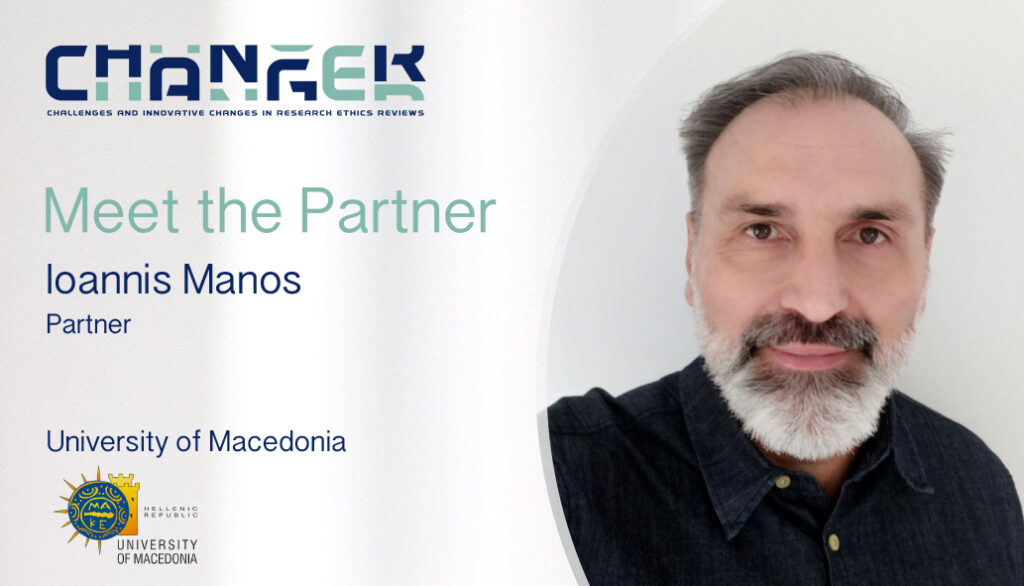
The University of Macedonia (UM) was established in 1990 in Thessaloniki, Greece. It specialises in social sciences, humanities, and computer engineering and aims to achieve excellence while promoting innovation, inclusivity, social sensitivity, and educational openness.
Role in the project: Dr. Ioannis Manos is an associate professor of social anthropology in the Department of Balkan, Slavic and Oriental Studies. He specialises in social research methods and holds a Graduate School of Social Sciences certificate at the University of Sussex, UK. Dr. Manos has also served as the Head of the Research Ethics Committee at the University of Macedonia. Furthermore, he has designed and led educational seminars on research ethics for students and teaching staff at the university, aiming to enhance their understanding and instil a culture of ethical diligence across our academic community. He contributes to the CHANGER objectives by improving the ethical evaluation processes used in research. He is developing innovative tools and educational materials to align current methodologies with new standards. Additionally, he is working on ensuring that new models and practices are transferable and effective for Research Ethics Committees.
Partner’s website: https://www.uom.gr/en
Karlsruhe Institute of Technology – ΚΙΤ
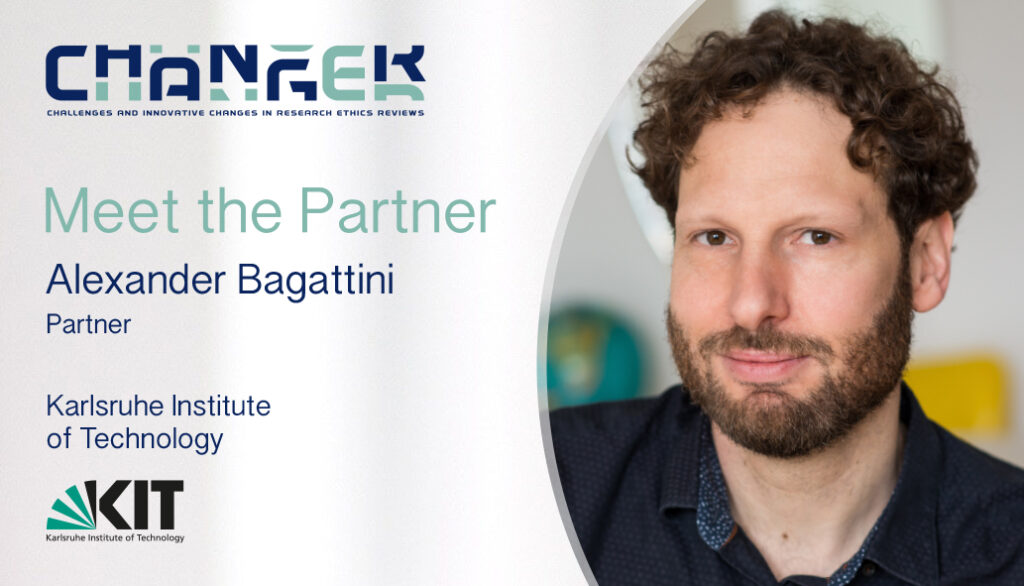
KIT is one of the largest German technical universities and part of the federal government’s excellence strategy (BMBF). KIT is represented by ARRTI (Academy for Responsible Research, Teaching, and Innovation). ARRTI develops innovative teaching formats for teaching basic ethical skills in research, teaching and innovation.
Role in the Project: PD Dr. Alexander Bagattini is an expert in applied ethics, especially philosophy of technology, and in teaching ethics in MINT subjects. Dr. Michael Schmidt is also an expert in applied ethics with a focus on reflective equilibrium. We are mainly involved in the development of the MOOCS in WP4, where our focus will be on the MOOC and the expert course on the ethics of AI.
Partner’s website: https://www.kit.edu/english/index.php
University of Coimbra – UC
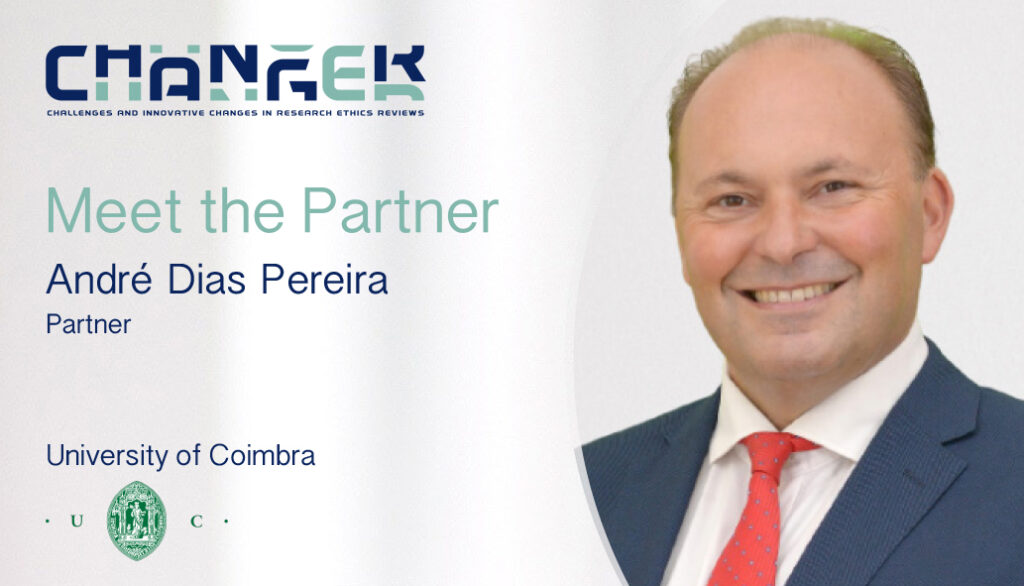
UCILeR is the only research unit at the Faculty of Law of the University of Coimbra. Fully aware of its tradition, contributing to the production and dissemination of legal knowledge in the last few centuries, UCILeR purpose is to steer its research to contemporary expectations and quality standards. UCILeR is proud of its past, and driven to meet the highest standards of excellence in its present and future activity. Grounded in this tradition, but with a forward-looking research focus, UCILeR’s research will focus on finding solutions (or ways to think and build solutions) to contemporary complex societal challenges, whilst experiencing alternative arguments of policy (informing policy making), as well as discussing the limits of (and the alternatives to) Law and legal system. With 77 senior researchers UCILeR covers a wide range of topics in legal research.
Role in the project: The team of UC will contribute in the work of novel approaches and tools to support the ethics reviews and in the identification of policy implications and the provision of guidance for policy makers.
Partner’s website: https://www.uc.pt/en

